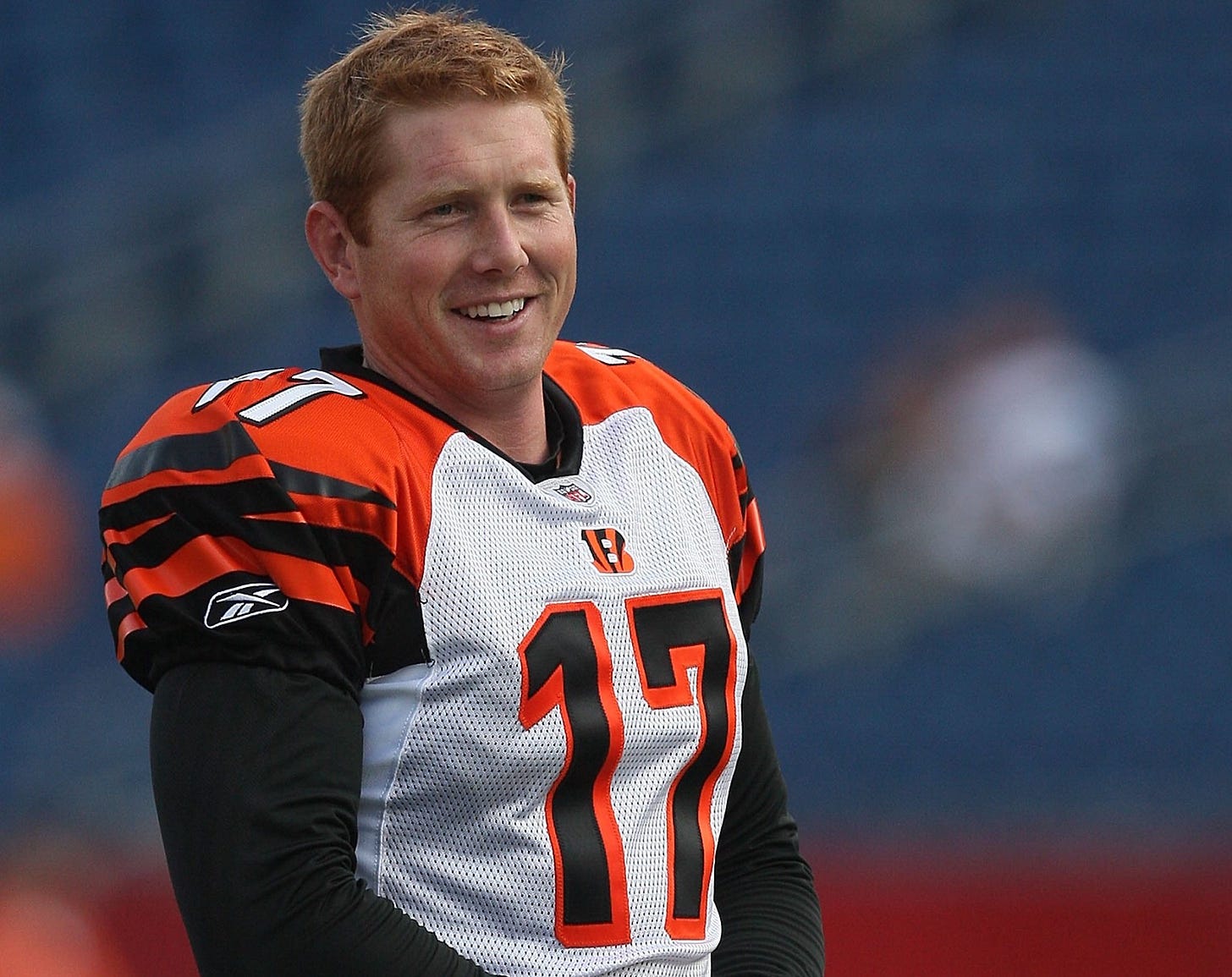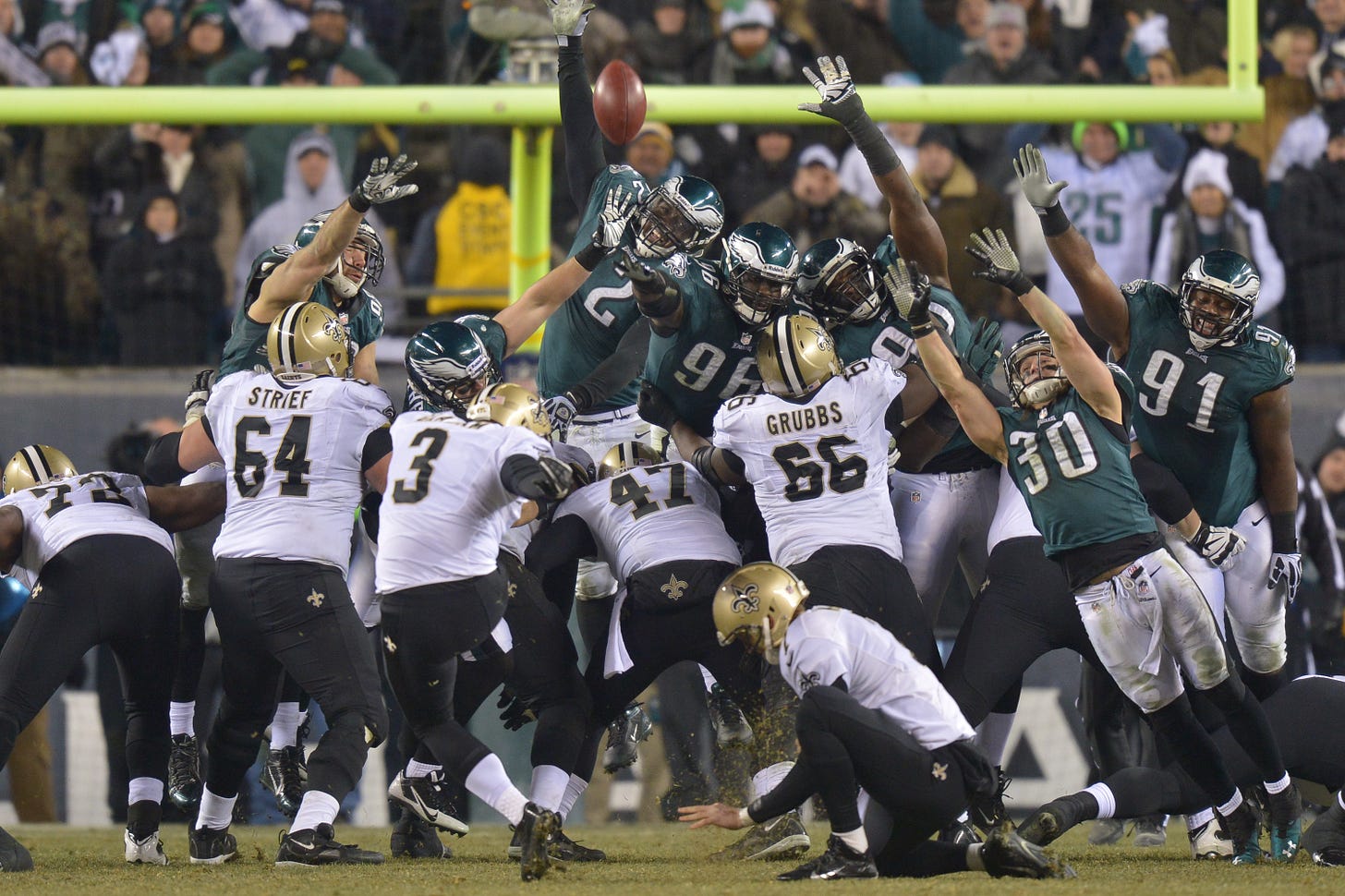Let's talk about kicking with Shayne Graham
We've ignored this position for far too long. Graham may revolutionize how NFL teams find kickers.
We’ve spent a lot of time here harping on the fact that NFL games today come down to the last minute. The “witching hour” on Red Zone requires a minimum two ibuprofen and, as Jacksonville Jaguars OC Press Taylor explained, the league’s built for teams to go 9-8 and 8-9. An extra game was added. Another playoff participant.
Surely a team everyone is freaking out about right now will find itself firmly in the playoff race by December.
It all heightens the need for a reliable kicker.
It almost feels weird typing that word — “kicker.” We’ve mostly ignored the position entirely at Go Long. Well, it’s high time we gave the position some love. I caught up with Shayne Graham recently for this Q&A below. Graham enjoyed a 15-year NFL career, drilling 85.5 percent of his kicks and earning a Pro Bowl bid in 2005, before then coaching at the college level with Central Michigan, Michigan State and Florida. Now? He’s personally training kickers and punters through his business, “Elite Winning Solutions.”
And Graham has also come up with a new way of evaluating kickers and punters. His “Elite Rating Index” scores them on four different components that, he says, directly predicts success. His goal is to make this the standard for evaluating kickers in the NFL.
Next offseason, Graham will bring his product to the large scale and it just may win your favorite team a Super Bowl.
Let’s get to it.
Go Long covers pro football through a longform lens. Subscribers can access all stories, all podcasts and all Zoom Happy Hours:
We all remember you kicking field goals. I think 85 percent for the career. Is that right?
Graham: I think if I remember it was like 85.5 or something odd like that.
Hey, we can't be jipping you a half of a percent. That's the difference between a lot of wins and losses.
Graham: At one point I think I maybe got up to 87 or 86 and change and that got me all the way up to No. 2 and I think even No. 1 at one time. I don’t even know if I’m in the top 20 anymore. These young guys are coming in here and — as soon as they get eligible by kicking their 100th field goal — these guys are bumping me down. Every year I get bumped down a little bit.
Why do you think that is?
Graham: When you look at the history of kicking, you look at like a Pete Gogolak who was the first-ever soccer style kicker. And this is maybe 1968 if I’m not mistaken or mid-to-late 60s. He brought this “sidewinder-style kicking,” is what people called it. And it created a whole new dynamic of power and ball contact and accuracy just through being more efficient with your full body vs. the old straight-on kicking. And when he did it, he was in the upper 60 percent, close to 70 percent sometimes. And that completely revolutionized a skill. Fifty percent back then was considered good. If kickers could make over 50 percent back in the 60s, it was considered all-star level. And when he came in, it revolutionized it. Well, what happened is he had a younger brother who was the next guy. Then you started having all these guys coming from Europe and South America and bringing this soccer style kicking form. But no one taught them how to do it. They just figured something out and they weren’t very efficient. They just did what they thought worked.
What happened is the generation below them — we’re looking at 10, 15 years — people learned from them. And then those people innovated their own way into it. So they got just slightly better. And then the people below them, you got to the Jan Steneruds. The guys that started to bring that late-80s and 90s generation of kickers.
And then when you go beyond that, then you've got the Matt Stovers, the John Carneys, the guys that brought the 90s into the 2000s. And that brought me, I was a part of the new generation of the 2000s. And then when all of us from that time-frame — the Adam Vinatieris, David Akerses. We then are starting to put our knowledge into these younger guys. And then the younger guys are also bringing the fact that they’re not just soccer players anymore. These are big strong athletes that also have a very sharply focused skill. They’re being taught the lessons that we learned — mentally and physically: How to avoid injuries, how to get stronger, how to handle mental situations. And that’s a lot of what I teach when I do my training. The mental lessons that I learned and how to keep your confidence and all that because we all know that's a big part of what kickers deal with. But it’s that generational growth that’s created this exponential flare of talent that these guys now have. And they’re getting to a point where it’s hard to be much better without being perfect.
The emphasis on the mental side of the game is greater at kicker, right? You’re waiting on the sideline. You see your team driving down the field. You know the moment's coming. It can eat you alive, and I imagine you went through your own ups and downs to survive as long as you did. You must’ve just kept plowing through it. But how would you even begin to describe that part of the game?
Graham: And that is a lot of what I do when I train these young guys. And one of the things that you have to fight against is there is such a diluted pool of instructors now, and this is nothing against any of these other instructors, but it’s a “crank out as many as you can get”-type model that we’re seeing. And so you’re seeing hundreds and thousands of these kids out here trying to be kickers, but they’re all focused on results — just making kicks vs. hyper-focused on body efficiency and all the things that make your body have longevity so you’re not putting stress on certain joints and your back and all these things. So you’ve got to fight against that. And while there are some of us out there that I think really know how to hyper-focus and fine-tune the techniques and forms that we’re trying to teach, I think what’s lacking is the mental side. And while there are some guys out there trying to work on that, I’m probably one of the only guys that gets as in-depth. I’m not saying there aren’t guys that don’t work with this, but I get very in-depth with the mental side of kicking because I knew that I went through my ups and downs and I experienced it. Not many coaches out there actually went through making and missing game-winning field goals in the NFL. In fact, most coaches out there didn’t even make it to the NFL. That’s why they became kicking coaches.
So for me, I got into coaching football after my playing career of 15 years and I loved coaching football. So then when it made more sense for me to spend more time with my wife than it did to spend coaching, because coaching college football, as you know is a very time-consuming enterprise. But when I decided to get into actually training kickers and punters and long snappers, I had a passion for the activity of the skill. I had a passion for coaching the skill and coaching football in general, but I had the experience of all the successes and failures of my playing career and learning what I had to do for myself by studying sports psychology, by studying the biomechanics of actually the motion of kicking, I think has led me to have this passion that I want these guys to have the advantages that I didn't have and that I wish I had when I played.
It does sound like everything that you’re doing is new with the “elite rating index,” where you’re scoring athletes on all these different components. Can you go a little deeper into this and what you're hoping to accomplish?
Graham: Yeah, so there has been this huge model of rating and ranking, especially for the high school kids. And what happens with that is there has been this huge market of I want to go get rated at this camp. So 500 kids show up, they all pay their money, they warm up, they kick, they get charted for 15 kicks or whatever it is. And it’s all kind of based on a very, “you made it, you missed it. It was kind of down the middle, it was kind high.” Whatever type of point value system they have. It's almost just a very binary, simplified rating system that then I’m sure is crunched into a bunch of numbers to create a rating and ranking. But you probably have to keep going to those camps to continue to climb or hold your rating or ranking. And what I wanted to create was a data-driven, completely based off of empirical data from the Trackman device. And the Trackman device, if you’ve seen it with golf and other sports, is very specific to what the ball does. And what I wanted to do was take the data: Ball speed, trajectory, side-to-side movement, accuracy, consistency, ball spin, all these different things that Trackman creates this data set for. And I wanted to scale it into a system that would allow me to say, “OK, when this ball is hit, this is as close to perfect as it can be. But then how often can we get to this same standard?” And I scaled it down to the high school level to find out what high school kids are getting close to the elite level of what it takes to be a college kicker. And then I’ve also created a scale for the college kicker or punter — I always include punter in that, too, by the way — that allows them to be compared on a scale to say, “This is how you score in comparison with being an elite-level NFL kicker.”
So taking this data, which is it’s mostly proprietary as to how I do it, but being able to take data where when I give it to a coach and I explain to a coach exactly what it means, they completely understand it because it’s what they look for anyway. I’m just giving it to ‘em with statistical data that basically reinforces and justifies what their opinion is on this player. So even if they don’t see this player in-person, they’re able to know because the data doesn’t lie. And it gives them the ability to compare them to what they actually already have and what the elite level is in the entire NFL.
And it sounds like college-level coaches, NFL level, they’re paying attention to this. How popular is it already getting with teams?
Graham: So I have many NFL coaches and many college coaches that are very interested in seeing this on a large scale. I just haven’t been able to unroll it to the public at the large scale that I want yet. It’ll probably happen this next offseason. But I did a lot of beta testing this past offseason, this past summer, and was able to find: “Hey, when I tested these kids, these are the kids that are or aren’t at a certain level, but it’s giving a true score for them.” If you’re scoring a 60 or a 70 on this scale, you’re not getting recruited by Division I schools for scholarships. But I had a kid that I tested that tested a 93 on there, and the kid who got a 93 was one of the highest-rated, highest-recruited kickers in the country, an All-American and is committed to TCU now. His numbers justified his recruitment. And there’s all kinds of guys out there that are like, “Coach, how do I get recruited by this school and that school?” And really my answer is: “You have to perform at the level that they want.” That’s it. If you can perform at the level that they want, then they’ll recruit you. Not everybody is as lucky as I was. My recruitment in high school, I was fortunate that I had a high school coach that I think I kicked close to 50 field goals in high school. And my coach let me attempt a lot. I made a bunch of 50-yarders. We kicked multiple field goals in games and recruiting became easier because I had stats and film from games that was easy to put out there. In today’s world, you might have an All-American kicker that might kick five field goals the whole season. In fact, Kyle Lemmermann at Southlake Carroll in Texas is an All-American kicker, but his high school kicks 100 PATs every year because they’re so dang good.
But if you get rated on this system, and I can show this to a coach and the coach can have access to this data, and I say, “Hey coach, listen, you’re not going to get much film besides training film from this guy because his team doesn’t kick a lot of field goals. But here’s what he does when he kicks and here’s how it compares to this kicker in college or the elite level, All-American level kicker in college. And here’s how it compares to a guy in the NFL. Kyle Lemmermann actually had numbers that scored equal to some guys in the NFL. Now that doesn’t mean he’s ready for the NFL. That just means there are certain aspects of his kicking that can measure against those guys.
These games are decided by a play. The way the league’s set up, it’s almost set up for everybody to go .500. So any little advantage that you can possibly find is massive.
Graham: You look at the way the NFL with the parity and the salary cap and all the things they try to do to make… it’s like NASCAR. Every car is supposed to have the same guidelines. They’re all supposed to fall within the same rules, but yet you always have one car that’s faster than the other, right? That’s the NFL. Every team has the same rules. Every team has the same amount of money they’re allowed to spend on their talent, but who can develop and make the use of that talent the best? And in a league where you have that kind of parity, special teams and kicking plays into it big time because that individual position? So much falls on it. Because you’re talking about a play on the field where a quarter of the plays might be special teams, if that, but yet a third of the field position yardage is accounted for on special teams.
When you think about that playing a major role, but then you look at the fact that NFL games on average, I think it’s a three-point differential average. And that one score, one field goal differential average tells you that every single field goal matters. And every single punt that’s downed inside the 5 matters because that punt down inside the 5 decreases the odds that you get infield goal range on that drive. So little things like that, that play into it, make it so important as to what the specialist role is in that game. And it’s a shame to the purist that says, “I don’t like that the guy with the cleanest uniform has such a big impact on the game.” But that's what makes the game beautiful. It’s a team effort. Not everybody in a NASCAR team plays the biggest role. Does the man who holds the gas can really play that big a role in a NASCAR team win in a race? Eh. It plays a role. But what if he drops the gas can on the way to the car and loses three seconds on that pit stop and another car gets out ahead of him and beats him and they never catch him again for the finish of the race?
Everyone’s like “the driver, the driver, the driver.” But all these other moving parts have to work perfectly as well. And that’s how football is. It’s a team effort where, yeah, the quarterback does this and the linemen do this and the receivers and the defensive backs and the linebackers, they all have all these big important roles, but the weight of the singular role that the specialist has with less opportunities for mistake is actually very, very heavy. And it’s something that really matters. And that’s why I believe that there needs to be a very highly detailed version of evaluating and making sure that you help get the talent that you want on that team.
I have been on record, full disclosure, saying that kickers and punters should be taken out of the sport and that it’s like having a 3-point contest break out in a hockey game. But you put it really well. So put me in my place. Tell me why I'm dead wrong.
Graham: (Laughs) I’ve heard that argument so many times and it’s one, do I take offense to it? No, because I honestly get the argument. I understand. But you take away a beauty of the game that makes football what it is. I mean, there’s no football without a foot, right? You might as well just call it tackle-ball or something. If you take the foot out of it, why are we even calling it football?
There’s a reason we call this football to begin with, and the foot element, as you put, it’s only gotten better over the years. When you look at the numbers in the 60s. But a lot of blood, a lot of sweat, a lot of tears, and then… it’s decided by a kick. But maybe I’m dead wrong. That NASCAR analogy is kind of perfect. It’s a true team. And if it is a true team, you need this element to your team.
Graham: Yes.
You made game-winning kicks. You lost game-winning kicks. Do you remember the made kicks more or the kicks you missed at the end of games?
Graham: I remember them all. The thing is, it’s not that you remember the misses more, it’s the emotional response is stronger to the misses. When you make a game-winning field goal, that euphoria that you feel is very strong and it is amazing. But it’s very short-lived because you immediately have to turn it around and ignore it so that you can be ready for your next game and your next part of your journey and your process of your season or career. And you use that to build your confidence. But the battle is when you miss that field goal, the negative feelings hit you so much harder than the positive ones do because as much everybody loves to love you and give you a slap on the back and all that, it’s almost like very soon after that it’s like, “Well, what's next?” The next game, the quarterback throws a game-winning touchdown. And your game-winning field goal — while still remembered — is not being celebrated anymore.
But with missing a field goal like that. One, the heartbreak and the heart-wrenching, gut-wrenching feeling you have is very strong. But then the response of potential teammates and fans and all of that just is that much stronger as well. And they don’t forget about those. And those can be things that can be brought up years down the road. And the whole fight of that is if you’re going to use the makes and the positives to build your confidence, you have to fight the negatives and the misses from hurting your confidence. And while the makes, you have to get over it really quick to let yourself stay level and you use it to build your confidence, the misses can always linger. And you have to find a way to keep them from lingering so that you don’t try to let that affect your fear of that same result in the future.
I live here in Buffalo, and you were there in 2001 right at the start of your career, and I’ve gotten to know Rob Johnson pretty well and he always says how much of a shitshow that year really was. How crazy was it?
Graham: It really was. And I got there late that season. Between the injuries that they had, between the crazy snowstorm we had that right around Christmas. We had a 5-foot blizzard. The experience there was not negative for me because it was my first NFL experience. But just seeing the way it unfolds, injuries plays such a big part in a team’s season and success. And you can have a team that's got the chemistry, that’s got the development, that’s got everything. But when you get injuries and you got to fill in positions and you’re filling in with guys that haven’t been a part of that team all year, it can sometimes create a challenge to keep cohesiveness. It can be a challenge to keep everyone focused when a couple things can go bad. You have to fight to not be distracted and tempted to lose focus just because you don't have a chance to go to the Super Bowl, but realizing that you’re in a job audition. When your team is out of the playoffs and it’s known and you’ve still got games to play, you have to understand you’re then being evaluated to keep your job at that point. Because we all know when a team has a losing season, there’s a few people that come up on the chopping block, and I can promise you that head coach knows, and that general manager knows like, “Hey, we are also on the chopping blocks, so we better figure it out and make sure we’ve got the right players here.” So it becomes a very tricky process at that point.
This was great. Let’s stay in touch.
Graham: Glad you changed your mind. I was afraid I was going to have to hope we didn’t run into each other in a dark alley.
ICYMI:









Really great writeup, Tyler. It makes sense that there's a seemingly massive interest in Graham's leveraging of the Trackman technology. I have a product background, so I'm excited to follow along and see how it grows from here.
I really like hearing about the specialists Tyler. I'm game for more.